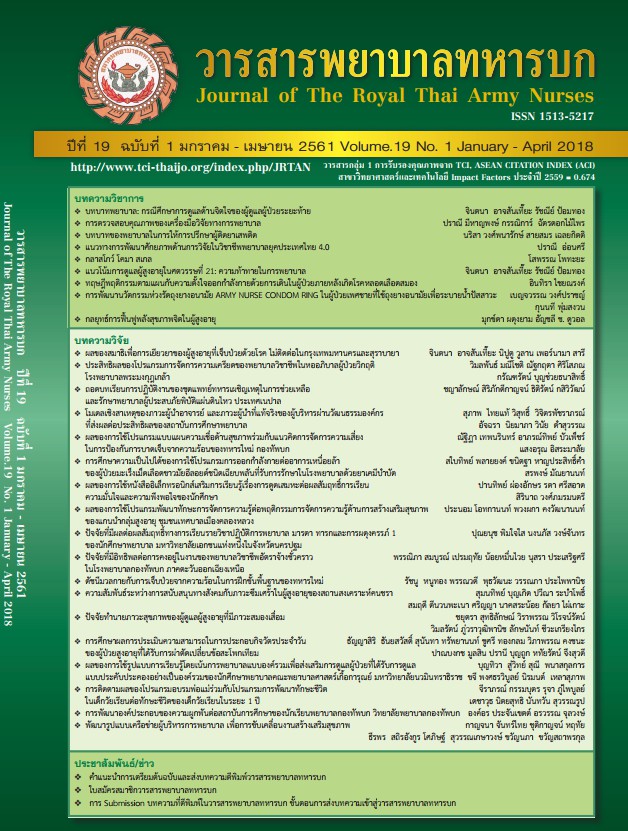ประสิทธิผลของโปรแกรมการจัดการความเครียดของพยาบาลวิชาชีพ ในหออภิบาลผู้ป่วยวิกฤติ โรงพยาบาลพระมงกุฎเกล้า
Abstract
การวิจัยครั้งนี้มีวัตถุประสงค์ในการศึกษาประสิทธิผลของโปรแกรมการจัดการความเครียดของพยาบาลวิชาชีพในหออภิบาลผู้ป่วยวิกฤติ โรงพยาบาลพระมงกุฎเกล้า เป็นการศึกษาแบบกึ่งทดลอง (Quasi - experimental research) โดยใช้แบบแผนการวิจัย Pretest – Post test Two group design ศึกษากับพยาบาลวิชาชีพที่ปฏิบัติงานในหออภิบาลผู้ป่วยวิกฤติโรงพยาบาลพระมงกุฎเกล้า จำนวน 60 คน ทำการสุ่มเข้ากลุ่ม เป็นกลุ่มทดลอง 30 คน และกลุ่มควบคุม 30 คน เครื่องมือที่ใช้ในการทดลองคือ โปรแกรมการจัดการความเครียด ประกอบไปด้วยการบรรยายประกอบวีดิทัศน์ การสาธิตและการฝึกปฏิบัติการแลกเปลี่ยนประสบการณ์ โดยใช้ทฤษฎีแรงจูงใจเพื่อป้องกันโรคมาประยุกต์ การเก็บรวบรวมข้อมูลก่อนและหลังการทดลองโดยใช้แบบสอบถาม วิเคราะห์ข้อมูลโดยใช้สถิติเชิงพรรณนา ประกอบด้วยร้อยละและสถิติเชิงอนุมาน เปรียบเทียบความแตกต่างของคะแนนเฉลี่ยภายในกลุ่ม โดยใช้สถิติ Paired Samples t-test และเปรียบเทียบคะแนนเฉลี่ยระหว่างกลุ่มโดยใช้ถิติ Independent Samples t-test ผลการศึกษาพบว่า ภายหลังได้รับโปรแกรมการจัดการความเครียด กลุ่มทดลองมีคะแนนเฉลี่ยการรับรู้ความรุนแรงต่อการเกิดความเครียด การรับรู้โอกาสเสี่ยงต่อการเกิดความเครียด ความคาดหวังในความสามารถของตนเองต่อการจัดการความเครียดความคาดหวังในผลลัพธ์ต่อการปฏิบัติตัวในการจัดการความเครียด และพฤติกรรมการจัดการความเครียดสูงขึ้นกว่าก่อนการทดลองและสูงกว่ากลุ่มควบคุม อย่างมีนัยสำคัญทางสถิติที่ระดับ .05
Effectiveness of Stress Management Program of Professional Nurses in Intensive care Unit at Phramongkutklao Hospital
This quasi-experimental research was designed to study the Effectiveness of Stress Management Program of Professional Nurses in Intensive care Unit at Phramongkutklao Hospital. Pre-test, post-test two control group design was used to examine 60 professional nurses in Intensive care Unit who were randomly divided into two groups. There were 30 experimental and 30 control. The experimental instrument was stress
management program for promoting sanitation behaviors developed by the researcher. The program consisted of lecture with video presentation, demonstrations and practicing, experiences exchange and application protection motivation theory. Data was collected before and after the experiment by using questionnaires. Descriptive statistics including frequency distribution, percentage, mean and standard deviation were used to analyze the data. Inferential statistics including Paired sample t-test and Independent sample t-test were used
to compare mean within and between an experimental and control groups. The results showed that after participating in stress management program of professional nurses in Intensive Care Unit, the experimental group had perceived susceptibility, perceived severity, expected of self – efficacy, outcome of expectation and behaviors for stress management than before participating in the programs and than those in the control group at .05 statistical significant level.
Downloads
Downloads
Published
How to Cite
Issue
Section
License
บทความหรือข้อคิดเห็นใดใดที่ปรากฏในวารสารพยาบาลทหารบกเป็นวรรณกรรมของผู้เขียน ซึ่งบรรณาธิการหรือสมาคมพยาบาลทหารบก ไม่จำเป็นต้องเห็นด้วย
บทความที่ได้รับการตีพิมพ์เป็นลิขสิทธิ์ของวารสารพยาบาลทหารบก
The ideas and opinions expressed in the Journal of The Royal Thai Army Nurses are those of the authors and not necessarily those
of the editor or Royal Thai Army Nurses Association.






